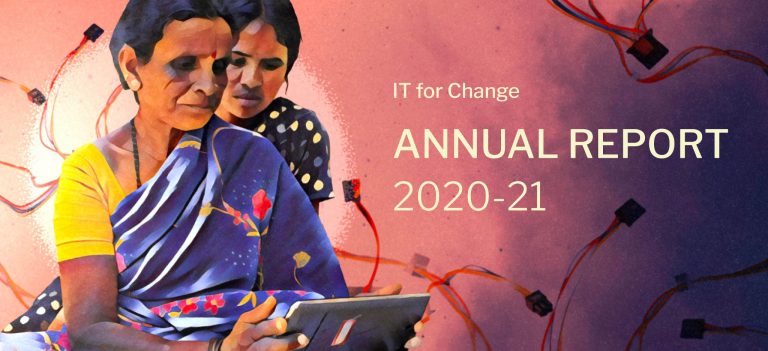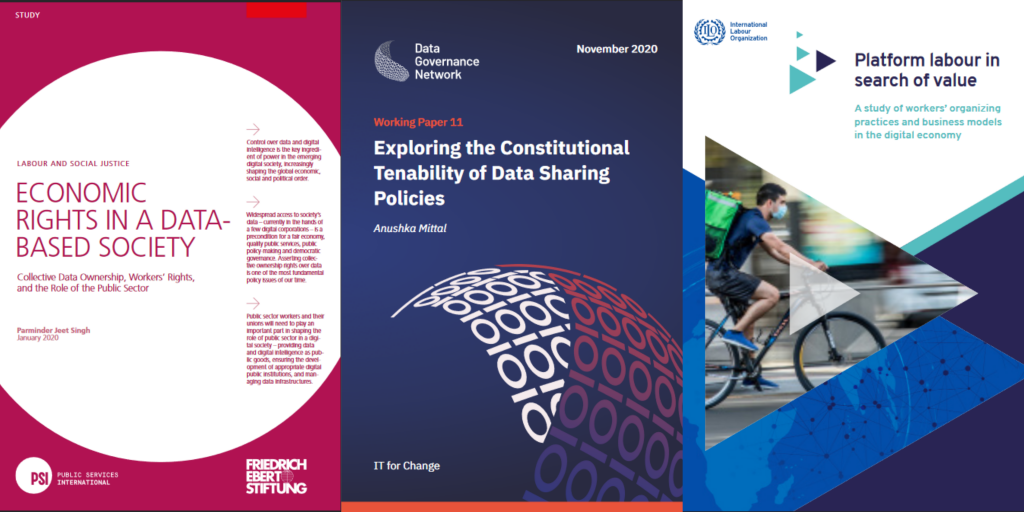
Digital Economy and Data Governance
Planetary datafication and platformization directly impinge upon people’s rights, with new issues and concerns for global and national governance. The linkages between rights, ownership claims, and equitable distribution of value in relation to data resources on the one hand – and the right to development on the other – are emerging as a deeply contested arena. Unless progressive forces watch over this space with vigilance, and shape it towards emancipatory futures for all, AI-powered reality may descend into the dystopian fictions that have inspired many a novel and film. Hence, our policy research and advocacy efforts in the area of digital economy have focused on appropriate governance of platforms, data, and AI technologies.
Research on Democratizing Data Value
In 2020-21, we explored policy directions necessary to rein in the monopolistic tendencies of Big Tech companies and reclaim the potential of data for equitable development. Our conceptual contributions to the Data Governance Network (DGN) were well appreciated for their innovative thinking in the network’s quarterly roundtables.
Our paper, Breaking Up Big Tech: Separating its Data, Cloud and Intelligence Layers, demonstrates how mainstream anti-trust regulation to tackle the abuse of market power does not sufficiently deter the rise of digital monopolies. We propose a new approach, arguing for a structural separation of the four key functional layers of data value chains – data, cloud, intelligence, and consumer-facing intelligent services.
We also systematically explored new theoretical frameworks to overturn the de facto claims that have enabled first-mover firms to enclose data as their own private property. Our paper, Economic Governance of Data: Balancing Individualist-Property Approaches with a Community Rights Framework, argues that a data regime conceived within an individualist approach to ownership will always be skewed against smaller solidarity economy alternatives. We call for a broader, meta-level ‘community ownership’ policy framework for data that can incentivize meso-level stewardship models to gain ground in the data economy. In the paper, Exploring the Constitutional Tenability of Data Sharing Policies, we examine how the directive principles of state policy of the Indian constitution can pave the way for a new legal approach that recognizes data as a collective resource of communities.
In addition to theoretical papers furthering the idea of collectivist claims in data resources, we also explored working models and alternative pathways for workers to assert their right to a fair share of data value. We were commissioned by Public Services International (PSI) to author a paper for trade unions in the public sector to claim their collective rights to aggregate anonymized non-personal data resources. The paper also made a case for the protection of public digital and data infrastructure from private capture, shifting the conversation on worker data rights from a narrow-band privacy and workplace surveillance focus to a broader conversation on a new data theory of value. Based on this paper, PSI has approached us to work on another paper to extend the framework to three specific sectors.
We were invited by the International Labour Organization (ILO) to undertake a landscape study on organizing strategies and alternative business models being deployed by gig workers in the platform economy. Pointing to why new age, data-shy, platform cooperatives run by Northern communities at the hyperlocal level cannot be imported to the Glocal South, the study argues for an ethically grounded, data collectivist approach as the way forward for cooperatives in the developing world. The first draft of the study was extremely well-received by the COOP Unit team of the ILO who considered it a pivotal contribution to their strategic prioritization in the lead-up to the ILO COOP 100 Symposium. The study will be published in 2021.

Digital Policy Engagements at National and Global Levels
Continuing our work as a member of the Government of India’s Non Personal Data Committee, we brought a ‘community resource’ governance framework to inform its work. There are no easy precedents one can turn to in shaping and articulating how data should be governed as an economic resource. Our inputs to the policy discussions in the Committee built on the fact that data is a social commons, deriving from the interactions of people and social phenomena. We submitted that, as a collective resource, data must be governed on the basis of a constitutional directive rights framework, justifying a new affirmative allocatory approach.
At the global level, we made inputs to the EU Draft Data Governance Act, 2020 as well as the EU Consultation for the New Competition Tool and Digital Services Act Package. We are co-chair of the Data Policy Circle of Transform Health, a major global coalition working in collaboration with the World Health Organization (WHO), the Lancet Commission on digitalization of health, etc. As a part of this initiative, we are helping frame principles for health data governance through a regionally and nationally consultative process. These principles will be launched in late 2021. We also made a submission to the South African Competition Commission’s public consultation on Competition in the Digital Economy.
We examined questions of data governance, digital economy regulation, and open digital ecosystems in proposed policy measures by engaging with policy dialogues in India and other countries. This includes a submission in response to the Government of India’s NODE White Paper. Our submission argued that public digital infrastructures (including platforms, data stacks, and APIs) created through state support would trigger inclusive innovation and promote social good only if backed by adequate checks and balances to govern access and use. Unconditional open access to such infrastructures would not produce fair and equitable outcomes by default. On the contrary, it would most likely lead to private capture by powerful players. We also responded to the public consultation on the Indian Artificial Intelligence Stack discussion paper released by the AI Standardization Committee, Department of Telecommunications. Our input argued for greater clarity on the institutional governance framework that would support the government’s plans to develop the Indian Artificial Intelligence Stack as a digital public good.
We have continued our efforts to highlight the egregious implications of emerging digital trade deals for the right to development of countries in the Global South, foregrounding the risks of hyperliberalization in digitalizing value chains. Over the course of the year, we regularly participated in South Centre’s briefings for G77 negotiators to continually emphasize the need for developing countries to protect their policy space for digital industrialization, without succumbing to unfair plurilateral and bilateral negotiations on e-commerce.
We worked with the Third World Network to initiate a webinar series on the India-US limited trade deal that was on the cards in the second half of 2020. We also provided strategic inputs to Focus on the Global South on how the liberalization of e-trading and agricultural markets in India, coupled with the prevailing Foreign Direct Investments (FDI) regulation in the farm sector, could lead to a corporate takeover of food value chains by e-commerce companies.
Fair, Green and Global Alliance
In January 2021, IT for Change was inducted into the Fair, Green and Global Alliance (FGG) – a consortium of eight global organizations whose goal is to expand civil society voices to make trade and global supply chains just and fair in Global South contexts. As part of this five-year program, IT for Change will focus on digital value chains, extending our work on Big Tech and platform regulation, data economy, platform worker rights, and gender justice.
Impact
Our impact this year can be best described over three areas. First, we made significant inroads into working with unions and cooperatives, both at national and global levels, on the digitization of work and its impact on worker rights. The theoretical framework we developed for PSI has been adopted in their union leaders’ trainings. Our policy framework on platform cooperatives, developed for the ILO put the need for redistributing value in the digital economy front and center. The framework identified the need for data policies that prioritize local economic regeneration for the post-Covid context. ILO’s Governing Body took note of the research and resolved to hold a general discussion on social and solidarity economy at the 2022 International Labour Conference.
Second, we contributed vital perspectives about economic rights to data, particularly along collective imaginaries. Our impact on the Government of India’s framework in this regard has been cardinal. We have also shared this work with other developing countries, and received requests for providing expertise in the area. Europe is at the forefront on data regulation, and we were the only organization from the South to engage with EU’s various draft legislations put up for public consultation. We also got some positive responses in this regard from the staff of the European Parliament. As a recognition of our deep domain expertise, we were invited to be a reviewer for UNCTAD’s Draft Digital Economy Report, 2021.
Third, we continued to forge and strengthen larger global civil society connections on the issue of digital economy governance. Multiple requests for collaborations, inputs, guidance, and consultation over the year have been a sign of the recognition of IT for Change as a credible South-led voice in the space. Continuing our work with the South Centre and Our World Is Not For Sale Network, we have been sharing our inputs and directions for the digital economy track of the WTO with them.
In March 2021, we were invited to serve as a rapporteur for the Canadian think tank Centre for International Governance Innovation’s (CIGI) research working group on Global Platform Governance Network, which identifies areas of research where governments should be investing, looking at barriers, and considering ways in which they can help research efforts.
We also continued to write and comment in the media on a number of issues on data and the digital economy. We wrote about community data and data commons, AI policy, and platform workers’ rights, and more for Live Mint, Hindustan Times, Indian Express, and the MIT Technology Review podcast.
Plans for 2021-22
In 2021-22, as part of our work with the FGG, we will be setting up a new research repository and a monthly newsletter, addressing questions of data and the digital economy from a global and regional perspective. Through this, we aim to create a resource bank for activists, scholars, unions, and other stakeholders on the current state of affairs, emerging policy action, and fresh perspectives on Big Tech regulation and implications for workers and small actors in the economy. We will also be launching a yearly report, taking stock of Big Tech’s capture of the digital economy and its implications. Further, we will initiate two research studies: first, a global research on the opportunities and risks for Micro, Small and Medium Enterprises (MSMEs) from developing countries integrating into transnational e-commerce value chains; and second, an India-specific exploration of the burgeoning ed-tech services market and its implications for education as a public good in the post-pandemic era.
We will also be undertaking two major studies directly involving trade unions in India and globally with Public Services International and UNI Global, respectively. We will continue to support national platform workers’ unions in enhancing their understanding of the intersections between workers’ data rights and traditional labor rights through capacity building events.
We will continue working on issues of economic rights to data and community data, and plan to frame a global model legislation with the help of a few developing countries and support from the South Centre. We hope to leverage the upcoming UNCTAD Quadrennial Conference as an opportunity to call for a reinvigorated push for digital industrialization. We will strengthen our engagement with the intensive data regulation work taking place in the EU, working with our EU-based partners, like Friedrich-Ebert-Stiftung (FES). We will also work with the Just Net Coalition to constitute working groups in areas such as global trade, finance, health, agriculture, etc. to contextualize data justice debates in sector-specific ways.

